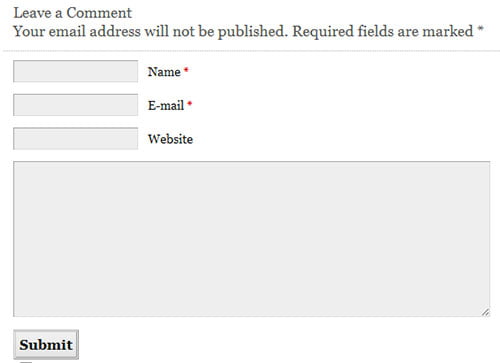Should you feel badly because visitors to your blog rarely leave comments? The question continues to dog bloggers who often feel slighted when they have high traffic levels, but few comments. After all, many visitors gauge the popularity of a blog by the number of comments left there. You should relax. When you learn the truth about blog comments, you will never worry again about this sensitive and persistent issue.
A Vanity Metric
You should consider the number of comments your blog receives as a so-called vanity metric. In other words, comments make you look and feel good, but they do not directly influence search-engine performance or your business. Furthermore, bloggers can easily create fake comments. Blog owners can often track and fake other vanity metrics such as Twitter followers, retweets and RSS subscribers, but you should exercise caution before spending too much time on things that do not matter. Bloggers who pay too much attention to the number of comments they receive could miss a bigger picture that portrays a troubled blog that urgently needs

As a blogger, you should aim to provide valuable content to your readers. When you do that, you contribute to the online community and set the stage for revenue generation. Comments might make you feel better, but they do not directly affect either the value of your blog or your income from it. You should pay careful attention to your marketing programs as well as SEO rather than spending a lot of time worrying about comments.
A Sign of Life
Similar to a long line of patrons waiting at a restaurant, a large number of comments can suggest popularity that could lead to increased participation. After all, people would not wait in line for a low-quality dining experience. Therefore, some people might willingly participate in a discussion if they see that a discussion has already begun. If you allow comments on your blog, but no comments appear on any of your posts, readers will not have sufficient inspiration to get on the bandwagon. However, the quality of comments left on your blog can also convey subtle messages.
Problems with comment spam have prompted many bloggers to altogether disable commenting features on their blogs. You should actively review all comments left on your blog to eliminate inappropriate and irrelevant content and links. Readers who see spam comments on your blog might conclude that you do not actively administer your blog. Therefore, you probably should disable comments if you do not have the time and the will to monitor them for quality.
A Personal Decision
Your blog can succeed with or without user comments, so you should carefully decide for yourself whether or not you want to allow such participation. As part of your decision-making process, you should consider whether you can accurately measure the performance of your blog by counting comments left by readers. Unless your business model requires that your blog foster a lot of discussion, you might want to focus on tangible performance metrics such as keyword performance, back links and social-networking mentions.
You should also evaluate your blogging style and your choice of topics to determine whether they will attract comments. You should also decide whether you want to spend the necessary time to moderate comments. Finally, design your blog to emphasize comments if you decide to attract comments. If you choose to de-emphasize or disable comments on your blog, find ways to help readers focus their attention on your content, products and services.
Business oriented blogs, that are used to give information on the current status of a company or the industrial area it covers are often commented on much less publicly but can result in a lot of personal communication (via e-mail or IM programs). An example: An update on construction of new condos in NYC can be highly relevant to your following but may not attract much public attention. Nevertheless, one engaged visitor who decides to contact you might be much more important than a regular commenter who brings nothing new to the table.



